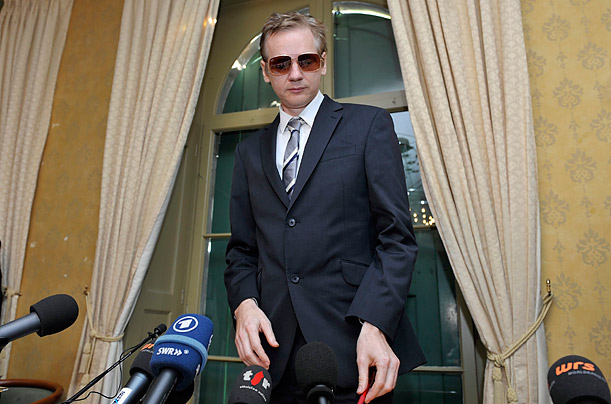
Clarification Appended: Jan. 4, 2011
On Dec. 9, 2006, an unsolicited e-mail arrived for Daniel Ellsberg, the whistle-blower of Vietnam War renown. The return address said only "WikiLeaks," and the signature at bottom, "WL." In the orotund prose of a manifesto, the message invited Ellsberg to become the public face of a project "to place a new star in the firmament of man." Ellsberg knew nothing of the group, which had yet to make its debut. Nor had he heard of its leader, a then 35-year-old Australian named Julian Assange, best known in his own circles as a teenage hacker turned "cypherpunk" — a prolific coder with visions of technology as a tool for political change.
The audacity of the e-mail kept Ellsberg reading. WikiLeaks aimed at nothing less than the decline and fall of oppression by organized exposure of its secrets. "Governance by conspiracy and fear," the author wrote, depended on concealment. "We have come to the conclusion that fomenting a world wide movement of mass leaking is the most cost effective political intervention." So fanciful did the proposal appear that Ellsberg saw only two ways to read it, he told TIME: as either "a little ploy by the CIA or NSA to draw in leaks" or "a very naive venture to think that they can really get away with it." Ellsberg made no reply.
Four years later, a great deal can be said about Assange, much of it unpleasant. He is inclined to the grandiose. Contempt for nearly every authority drives his work, and unguarded e-mails — leaked, naturally — reveal hopes that transparency will bring "total annihilation of the current U.S. regime." In London, he is fighting extradition to face allegations in Sweden that he sexually assaulted two WikiLeaks supporters.
What no one can say about the man, any longer, is that his boasts are empty. In 2010, WikiLeaks became a revolutionary force, wresting secrets into the public domain on a scale without precedent. Assange and company wrought deep disruptions in the marketplace of state power, much as tech-savvy insurgents before them had disrupted markets in music, film and publishing. The currency of information, scattered to the four corners of the globe, is roiling not only U.S. foreign relations but also the alliances and internal politics of other nations.
WikiLeaks has established itself, too, as a competitor to news media and intelligence agencies. By posting documents in their entirety, the site "disintermediates" the market, as economists say, weakening the old prerogatives of editors and analysts to filter information for their audiences. "This is not just a threat to those who would want to keep their own secrets," says a former member of the site's steering committee, who declined to be named. "WikiLeaks is a threat to those who would like to have other people's secrets too."
Not the least of Assange's achievements is a technological one. WikiLeaks brought to life what one of its early advisers described as "a recurring idea in hacker culture — a digital safe haven that is anonymous, massively collaborative and highly resistant to attack or penetration by intelligence services." Redundant hardware and Web servers span international borders. Participants in its design say WikiLeaks has made novel use of an alphabet soup of existing geek tools, such as mutually anonymous file sharing, decoy ciphering to flood eavesdroppers with empty data, and encryption of files in transit and in storage.
The results are impressive. In Ellsberg's day, it took nearly a year to photocopy the 7,000-page Pentagon papers and most of another year to get excerpts published. The push-button model of WikiLeaks compresses the timeline radically and permits the universal broadcast of voluminous archives in full, so much so that leak hardly seems to suffice as a metaphor. This year's breach of containment spilled nearly half a million documents, including 76,607 military reports from Afghanistan, 391,832 from Iraq and, beginning Nov. 28, a stream of diplomatic cables that WikiLeaks says will eventually number 251,287.
The Obama Administration responded with new floodgates. "The government has recognized that WikiLeaks is not an event — it is a capability — and anybody who can get material out of a classified system can now publish it worldwide in a way that can't be redacted or removed," says Clay Shirky, a New York University Internet scholar. "The idea of a widely shared but secure secret is over." So in the U.S. national-security establishment, the scale of the loss induced a retreat from the "need to share" culture that emerged after Sept. 11, 2001, and that pressed rival agencies to exchange information instead of hoarding it. In the run-up to the WikiLeaks dump, the State Department cut the link from its Net-Centric Diplomacy database, which stores cable traffic, to the Pentagon's classified SIPRNet. Today, three shifts of officers and analysts are working around the clock in separate State and Defense Department crisis teams, sending alerts about fresh disclosures in real time.